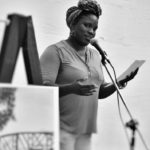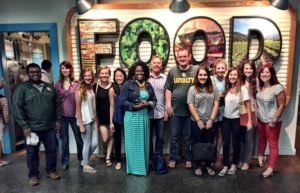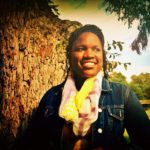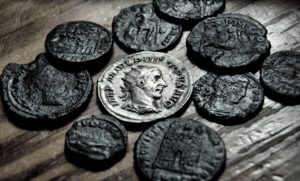by Liz Ligawa
Can you remember a time when you were not believed? As you think back to that time, how do you remember it impacting you? Was doubt able to sneak in and influence the credibility of your own story? Perhaps, as a response, you became a little more selective with what you shared, or at least, with whom you shared. I posed this same question to about 50 undergraduate students in a Human Diversity class where I was the guest lecturer. What we learned, as a class, of these kind of events was telling: incidents where our experiences were invalidated by doubt or unbelief began to invisibly shape how we related to others, but more significantly, we tended to wrap our truths with silence as we learned to navigate a world that had little room for our perspective.
This simple exercise I conducted with that class still resonates with me. It speaks of how one human experience can shape so many others. Although the examples shared were relatively light in nature, and were part of common childhood experiences, the impact of those incidents on the future behavior of these truth-sharers was great. I was not expecting behavioral changes to be the result of these incidents, but they were.
In our work, we speak a lot about collaboration. Our current posture toward collaboration comes from the realization that the work, and the outcomes we hope to achieve from this work, cannot happen without the collective work of many hands. In our urgency to approach the work with these many hands, however, I have observed a common forgetting (of sorts). We seem to forget that those hands are connected to people, and people function through relationships. In her book titled, Teaching Peace: A Restorative Justice Framework for Strengthening Relationships, Dr. Beverly Title alerts us to pay attention in this way. “Every relationship is valuable, no matter how insignificant it may first appear, as it is a potential window to wisdom,” (Title, 2011). Sometimes in our ambition to work, we forget that the hands are connected to people, and that it is in those people where the wisdom for the work is contained.
The Aspen Institute recently published a helpful review of community change initiatives (CCIs) over the last two decades so that the work going forward can be better informed. In their publication, the voice of relationship was also heralded as a necessary component toward change: “Comprehensive change in the most disinvested communities required effective working relationships across a multitude of community, private, and public institutions. Since poor communities had long been disconnected from outside entities, the key to sustained long-term change was to build cooperative connections,” (Kubisch, Auspos, Brown, & Dewar, 2010). In social work, we consider human relationships central to change. This is our value. So, how does this play out?
When joining the work of marginalized communities, or communities experiencing significant change, I pay attention to the role that disenfranchisement, or disconnection, has played in the life of the community. Feeling unheard is a great suffering. Not only is it difficult navigating systemic barriers that function oppressively, but it is also not the first thing that people want to talk about. Life is life, and most of us are busy just going about it. So, as I go about learning what life is like, I look for the many ways available to build the trust requisite to connect the hands to the work. Sometimes it means I show up. Sometimes it means I share. But most often, I find that trust is built on an ordinary path that many have left grown over. The path to trust is simply believing the truth that is entrusted to you. And, in the dignity of those every day moments, the work finally becomes shared, and perhaps our investments of hope fulfilled.
 Elizabeth Ligawa is a recent graduate from Truett Theological Seminary, and the Diana R. Garland School of Social Work, earning both her Master of Divinity, and Master of Social Work. Though her prized role is being a mother to her dear son, Elijah, Liz has a love for encouraging people to come together in ways that engender healthy communities. Her role as the Director of Community Engagement at Prosper Waco allows her the room to work in and among the many faces of her beloved Waco community. She may be reached at liz@prosperwaco.org.
Elizabeth Ligawa is a recent graduate from Truett Theological Seminary, and the Diana R. Garland School of Social Work, earning both her Master of Divinity, and Master of Social Work. Though her prized role is being a mother to her dear son, Elijah, Liz has a love for encouraging people to come together in ways that engender healthy communities. Her role as the Director of Community Engagement at Prosper Waco allows her the room to work in and among the many faces of her beloved Waco community. She may be reached at liz@prosperwaco.org.
The Act Locally Waco blog publishes posts with a connection to these Aspirations for Waco. If you are interested in writing for the Act Locally Waco Blog, please email ashleyt@actlocallywaco.org for more information.
By Liz Ligawa
Her name was Lulu. She was from Vietnam, and seemed to be around 70 years old. I gently handed Lulu a flyer we were sharing with those experiencing housing insecurity. It was about the worship service which would be held in the park on Tuesday, and the Sunday service which would be held at the church followed by a meal. Lulu looked up at me quizzically and replied, “We have no food. Nobody come today. We are hungry.” The day was Saturday.
 I had been looking forward to this D.C. Hunger in America trip for the past few months. My natural inclination towards advocacy seemed to fit well with what Baylor Missions and the Texas Hunger Initiative were working on in D.C. with regard to addressing the need of food security. I was ready. Who would not want to help with this issue?
I had been looking forward to this D.C. Hunger in America trip for the past few months. My natural inclination towards advocacy seemed to fit well with what Baylor Missions and the Texas Hunger Initiative were working on in D.C. with regard to addressing the need of food security. I was ready. Who would not want to help with this issue?
Not many people know this, but the way Ashley Thornton, the Director of Act Locally Waco, and I became acquainted was through this Act Locally Waco blog. I had a dissenting opinion on an article that was posted, and she in turn asked if I would consider contributing to the blog. She wanted to get together to chat. I was stunned (and a little bit scared). Who responds to dissent in this way? Ashley does. But she does not respond in this way to dissuade you from your position; she honors dissent on the search to find ways to include more voices in the conversation. On this trip, I would realize that I would have to also find ways to include others in this dialogue-especially when talking about the economically poor.
“1 out of 7 senior adults are food insecure.” –National Council on Aging
I looked around to see if there was anyone with Lulu. She did not have a home, but surely she was not out here by herself, right? I wanted to know, but Lulu mainly spoke Vietnamese. One of the fellow students on the trip was also Vietnamese…and Lulu was able to share her story. Lulu was alone. Her son had left her.
During the week in D.C., we had several opportunities to use our voices to influence political will. We participated in advocacy meetings on the capitol with representatives. We met with heads at USDA, and discussed policy implications with direct reports to President Obama. We visited several agencies committed to addressing food insecurity, and even attended a Sub-Committee hearing on food benefit programs. There was a lot of talking (and walking). But there, in front of Lulu, I was faced with my own limitations. I had been talking about the need for food security all week, but I did not even have a granola bar in my pocket to offer Lulu. I felt like I failed her.
That is when something amazing happened. A small group of hipster guys (dissenters in their own right) started setting up a table at the far end of the park. I was curious as to what they were doing, but I wanted to complete the assignment that brought us to the park, and share with others the opportunities available through the church that sponsored us. After a few moments, my curiosity won out, and I decided to check them out.
The first thing I noticed was a banner, “Food Not Bombs”, hanging over the front of the table. Dissent. At first I didn’t notice any food with them, and I thought it was in poor taste to protest against funds for weaponry among those who need food. I was not against their dissension, I just did not understand its place. But then I started a conversation, and realized not only did they have food, but they had fresh fruit, salad, and soup was on the way. They were there to serve those who were hungry. I could think of nothing more honoring to do than join them.
What happened in the park that day reminds me of the model that the Texas Hunger Initiative uses to serve well while reducing hunger: Public, Private Partnerships. Don’t let the term frighten you if you are not familiar with it. It just boils down to: “Many hands make lighter the load”.
 THI is doing some great work with this model, and they are helping people like us, and organizations we are a part of, figure out even greater ways to serve. I had to look further than what I thought the hipsters were doing to see that we shared in significant and important work together. So, if this is your thing, you should check THI out: www.baylor.edu/texashunger. Tell Doug that Liz sent you.
THI is doing some great work with this model, and they are helping people like us, and organizations we are a part of, figure out even greater ways to serve. I had to look further than what I thought the hipsters were doing to see that we shared in significant and important work together. So, if this is your thing, you should check THI out: www.baylor.edu/texashunger. Tell Doug that Liz sent you.
“It’s my pleasure to serve you,” I would repeat over, and over again as I placed a ladle-full of fruit in a cup for welcoming hands. “It’s my pleasure to serve you.” There were so many gathered. I was going as fast as I could, but still wanted to be gentle, and kind with every cup offered. All of a sudden, the group in front of me parts down the middle, and a tiny lady comes through offering up gloved hands, and soft eyes. My heart leaps, and I can barely get a whisper through my tears, “It’s my pleasure to serve you, Lulu…My pleasure to serve you.”
 This post was written by Liz Ligawa. Liz is a graduate student of Baylor University where she has found the perfect expression of her community-centered heart in the MDiv/MSW degree program. With a concentration on Community Practice, she is also the adoring mother of one son, Elijah, who prefers to be regarded in public as Spider-Man. She may be reached at Liz_Ligawa@baylor.edu.
This post was written by Liz Ligawa. Liz is a graduate student of Baylor University where she has found the perfect expression of her community-centered heart in the MDiv/MSW degree program. With a concentration on Community Practice, she is also the adoring mother of one son, Elijah, who prefers to be regarded in public as Spider-Man. She may be reached at Liz_Ligawa@baylor.edu.
The Act Locally Waco blog publishes posts with a connection to these aspirations for Waco. If you are interested in writing for the Act Locally Waco Blog, please email ashleyt@actlocallywaco.org for more information.
by Liz Ligawa
Her name is Olivia. And six years ago, she was expected to be born this month.
I was finally enjoying a stress-free day. After just wrapping up classes for this semester, I allowed myself to enjoy some respite from academic rigor by scrolling, unthinkingly, through my Facebook newsfeed. As I scrolled, I laughed…smiled…blocked (you just have to do that sometimes), and then suddenly stopped. NPR was seeking feedback on their Facebook page about what people “wished others knew about miscarriage”. I stared blankly at the screen of my iPhone, and felt uncomfortably, unnervingly bare. “How did this find me?” I wondered as tears rolled at pace with sighs. I tried to continue scrolling down as if I never saw the post. I looked for things that were funny. I looked for things that were cute. I looked for anything that would help me escape from dealing with the dynamite that had so casually been laid in my lap. This escape I could not find.
Our society has carried a message pretty well. The message we have historically been exposed to is one that makes womanhood synonymous to motherhood. Even a woman’s age is labeled with respect to having children- “child-bearing age”. The moment we become engaged, we start receiving inquiries regarding if we will have children. As soon as we sashay down the aisle, we are asked when we will have children. As soon as the first child is out, we are asked when we will have another. It seems to never end. Now, I am not against women, or children, or women having children, I just wonder what message we are sending to ourselves and other women when motherhood is not a part of our story.
I never expected to no longer be expecting. I did not anticipate the certainty of loss. As the news that I was carrying ignited applause, the fact that I miscarried would be silently observed. Unfortunately, I received this silence as a directive since I also did not know how to respond.
I scrolled back to the NPR Facebook page. I did not have a plan for what I would do once I got to the page. I was not even sure if I wanted to contribute to the survey. I just knew I had to go back. I cautiously started to view the comments that were listing. I wondered what truths would register in my heart, but also feared the shame that could also be exposed. Comment after comment, they kept on coming. Line upon line, they took ownership of space. One after the other, they told a story, and expressed truth. Post, after post, after post: Grief. Shame. Uncertainty. Self-Blame. Disbelief. Scorn. Fear. Rejection. Loss. Loss. Loss. I recognized my story. I recognized myself. What I did not understand is why we discuss this loss in such muted terms. Why do we whisper these wounds? Is it wrong to suffer loss?
As a newlywed, I was told that I would have plenty of time to try for more. As an expectant mother, I just wanted my baby.
As I looked at the commentary, I started to wonder how much our society’s view of womanhood and motherhood had to do with our personal experiences of loss. Should grief be automatically flanked by guilt and shame? If motherhood and womanhood were not used interchangeably, could we appreciate each more? If I am a woman, is it okay not to be a mother? My personal experience of guilt and shame were founded on the belief that having a child was as simple as being a woman. It is just not true. Some of the women who have impacted my life the most are those without birth children, or who have experienced loss of a child. I consider myself a part of them, and I am deeply privileged to be one of theirs.
In considering how I could listen more closely to others so that I may hear their whispered wounds, I learned that I first must bear witness to my own. When I ran across the Facebook post, it had been a year since I had spoken Olivia’s name, and just as long in acknowledging that pain. In this way, I am thankful for the survey.
So, on this day that mothers are celebrated, I am mindful of the mothers who have suffered loss; I am respectful of the dear ones who long to mother; I am honored by the ones who mother alongside me; and I am grateful for the ones who mother me.
Olivia
I grieve the first one of my womb
With hidden words
And muted hues
Silently and underneath
The uninquiring pleasantries
Stifling questions held the applause
Of things to be, now just what was
And memory’s unforgiving stare
Credits me for what’s not there
I grieve in syncopated breaths
When stillness fills the room
I grieve in smiles and how-do-you-dos
When still is gone too soon
We spread the news too soon I guess
But even those who knew
Are scared to hear or tell of you
The first one of my womb
-Liz Ligawa
If this post spoke to you because of a personal experience of miscarriage, stillbirth, early infant loss, or infertility, you may be interested to learn about Cradled by Love, Hope and Healing an organization in Waco that offers individual support as well as weekly peer support groups.
 This post was written by Liz Ligawa. Liz is a graduate student of Baylor University where she has found the perfect expression of her community-centered heart in the MDiv/MSW degree program. With a concentration on Community Practice, she is also the adoring mother of one son, Elijah, who prefers to be regarded in public as Spider-Man. She may be reached at Liz_Ligawa@baylor.edu.
This post was written by Liz Ligawa. Liz is a graduate student of Baylor University where she has found the perfect expression of her community-centered heart in the MDiv/MSW degree program. With a concentration on Community Practice, she is also the adoring mother of one son, Elijah, who prefers to be regarded in public as Spider-Man. She may be reached at Liz_Ligawa@baylor.edu.
The Act Locally Waco blog publishes posts with a connection to these aspirations for Waco. If you are interested in writing for the Act Locally Waco Blog, please email ashleyt@actlocallywaco.org for more information.
by Liz Ligawa
I was sitting in my doctor’s office as I awaited my time to be seen. The “things to do” from our last visit scrolled through my head, ready to spill out as soon as she walked in: Decrease sodium intake. Increase physical activity. Limit processed foods. Take time to rest. These were not unkind recommendations. In fact, this wise counsel was offered to me by one of the most generous souls in medicine I know. But I still had not done it. So, I decided to keep quiet about the list- silently hoping she would not notice. Though she kindly observed my silence, she allowed her instruments to reveal the truth.
Over the last six months or so, I have been listening for, and to our community concerning the safety of Americans of African descent in relation to police. The dialogue and inquiry which has pulsed through communities across our country seems to have found censure in Waco. Is there something different about Waco that would make these conversations unnecessary? Is Waco a unique community which is immune to the ills suffered by Ferguson, MO or New York? Why is Waco so silent?
Before I continue, let me be honest. This subject is quite difficult for me. It is not what I originally intended to write about. I even struggled with feelings of inadequacy to engage this topic. However, even as I strongly embraced the urge to keep a safe distance from this truth, I realized that although it does not appeal to my comforts, I must acknowledge its appeal to my conscience. There is much to be heard in silence.
Waco has a history about which she keeps silent. It reminds me of the invisible boundaries we all adhere to in our families. Only a couple of months ago, many of us participated in these waltzes as we navigated the hushed topics of family members during the holidays. We will not discuss David’s drinking even as we grow nervous with each subsequent glass. We do not check in on Miriam and Max’s marriage even as resignation fills their eyes. And it sure would not be polite to mention the miscarriage suffered by Destiny and Deleon; they still have little Suzy anyway…right? Silence protects our secrets.
Jesse Washington is one of Waco’s secrets. Its own history with Americans of African descent is the reason Waco remains silent.
I was listening to a brief TED talk by an educator named Clint Smith. In his discussion about silence, he takes courageous steps of vulnerability and discloses motives which took their turn in rendering him silent. Smith shared that though he had focused his passion to liberate his students, charging them to not abscond with their truth, he found himself in need of being reminded of the truth: “We spend so much time listening to the things people are saying that we rarely pay attention to the things they don’t: Silence is the residue of fear.”
I wonder how you are dealing with my silence in this article. There are many things I have left unsaid. Up until now, if you did not already know the story about Jesse Washington, there is not much more you know from reading what I have written. Up until now I have not mentioned that he was an African-American farm hand. Up until now, I have not mentioned he was held responsible for the death of an Anglo wife of a cotton farmer in 1916. Up until now, I have not mentioned our McLennan County courthouse…the hanging tree…or what was made of the charred remains of a man not valued by society; not valued by his Waco community. Our silence tells a story.
In the doctor’s office that day, my silence told a story. If Dr. Duchamp would have only attended to my smile, I would have seemed alright. If she would have only paid attention to my put-together presentation, she would have had no concern. If Dr. Duchamp received my silence as an indicator of all things well, my needs would have remained unaddressed and on course for unfortunate events. I am grateful she practiced well when the truth was hard for me to tell.
In the silence I hear in our community, I am trying to decipher what it means. There are steps which have been made with regard to this part of our history, but there are silences still needing to be attended: the silence of apology in the resolution; the silence of Mr. Washington’s name.
Yes, silence tells a story on its own. What story are you telling with yours?
 This post was written by Liz Ligawa. Liz is a graduate student of Baylor University where she has found the perfect expression of her community-centered heart in the MDiv/MSW degree program. With a concentration on Community Practice, she is also the adoring mother of one son, Elijah, who prefers to be regarded in public as Spider-Man. She may be reached at Liz_Ligawa@baylor.edu.
This post was written by Liz Ligawa. Liz is a graduate student of Baylor University where she has found the perfect expression of her community-centered heart in the MDiv/MSW degree program. With a concentration on Community Practice, she is also the adoring mother of one son, Elijah, who prefers to be regarded in public as Spider-Man. She may be reached at Liz_Ligawa@baylor.edu.
The Act Locally Waco blog publishes posts with a connection to these aspirations for Waco. If you are interested in writing for the Act Locally Waco Blog, please email ashleyt@actlocallywaco.org for more information.
by Liz Ligawa
 Chances are you have reached this article through a post on your Facebook newsfeed. Being well-versed in the ins and outs of this media outlet, you are probably well aware of a coveted, and infamous symbol. A symbol that is used to convey quick, but not necessarily thorough, feedback. A symbol that will be used 1.8 million times in the next 60 seconds. A symbol that right now probably sits lonely and desaturated in shades of grey and disregard; but by the end of this article, may glow with an affirmative shade of blue: the “Like” button.
Chances are you have reached this article through a post on your Facebook newsfeed. Being well-versed in the ins and outs of this media outlet, you are probably well aware of a coveted, and infamous symbol. A symbol that is used to convey quick, but not necessarily thorough, feedback. A symbol that will be used 1.8 million times in the next 60 seconds. A symbol that right now probably sits lonely and desaturated in shades of grey and disregard; but by the end of this article, may glow with an affirmative shade of blue: the “Like” button.
Now, imagine with me the completely unlikely event that you reach the end of this article and find yourself dissatisfied with the exposition of this subject, or at odds with the perspective of its astute author. If you find that you do not like this article, do you have the same options available to you to “dislike” as you do to “like”? The answer is no, and this absence speaks volumes about our culture’s relationship with dissent. But is agreement the only useful reply?
In social work, one of the skills we are required to learn and develop in becoming competent practitioners is a skill called Reaching for Negative Feedback. When using this skill, the social worker intentionally asks his client for feedback concerning unmet expectations, incompatible goals, unwanted outcomes, or any client experience which could be improved upon. It is a vulnerable yet valuable position for the social worker, and an honoring position for the client. At first, I did not comprehend the necessity of this skill, nor understand why we had to inquire about discontent. That was until I considered our boardrooms, our workrooms, our classrooms, even our living rooms — all common places in which we do not readily give permission to disagree. When was the last time you disagreed about a certain course of action where you work, or learn? When was the last time you were asked about it?
In her TED talk, speaking about the power of disagreement, Margaret Heffernan shares the benefits that disagreement has on progress and development. According to Heffernan, great teams and businesses are created when “people are allowed to deeply disagree.” This concept seems to go against what we have been taught about leadership and management. How do we build consensus if we encourage disagreement? What levels of success might we expect from a company that approves dissent? The issue that Heffernan raises is that it’s not that we never disagree with matters in our workplace, homes, or our communities; it is that most of us simply never voice it.
During a recent meeting I had with my mentor, I found myself struggling with the experience of a lack of permission to disagree. My mentor listened intently as I described my attempts to resolve a progressively, deteriorating dilemma. She would interject, calmly, and pause – giving me time to recognize in my own voice the discomfort I was experiencing. Suddenly, in the midst of my exasperation, she said, “You can say that, Liz. You need to know you can say that.” I stopped. She waited. Everything paused as I observed this unfamiliar, yet deeply empowering gift of permission. I did not know it, but I had been struggling with respecting the power of dissent.
 What was your response the last time you were uninterested, or displeased with a post? Sometimes dissent will be referenced in the comments, but most of the time, it will simply be through the “Like” button left to its passive, default grey. This lack of comment, lack of dissent, takes a significant toll on the strength of our organizations. We sacrifice critical thinking, creativity, and growth. What tends to grow in this type of environment is a sterilizing culture of fear and resentment.
What was your response the last time you were uninterested, or displeased with a post? Sometimes dissent will be referenced in the comments, but most of the time, it will simply be through the “Like” button left to its passive, default grey. This lack of comment, lack of dissent, takes a significant toll on the strength of our organizations. We sacrifice critical thinking, creativity, and growth. What tends to grow in this type of environment is a sterilizing culture of fear and resentment.
Are we bold enough to hear what others have to say? Am I bold enough to receive negative feedback from this post? Waco, we have a lot to offer one another. We are enriched by our many voices; if only we will give them room to be. The integrity of our ideas is not held together by neatly spaced stitches of affirmation, or commendation. Our ideas should show indications of wear, and use. They should have fingerprints and smudges; evidence of being held and evaluated by others. Let them be worn and disheveled; let them be tattered and renovated. Let them be anything other than praised without inspection.
For two decades, Dr. Alice Stewart was the sole dissenter against using radiology on pregnant women due to the effects she observed in the unborn child. In our own country, the Civil Rights Movement was carried by those willing to stand for a collective voice of dissent to the nation’s laws. In Ferguson, a heartbroken community seeks justice through its gathered voice of dissent. Dissent should not be as easy to disregard in our everyday lives as it is on social media. It should find a common respect among other celebrated forms of communication.
You have now reached the end of this article. Consider this my formal attempt at Reaching for Negative Feedback. When was the last time you heard, “Dissenting opinions accepted here”?
 This post was written by Liz Ligawa. Liz is a graduate student of Baylor University where she has found the perfect expression of her community-centered heart in the MDiv/MSW degree program. With a concentration on Community Practice, she is also the adoring mother of one son, Elijah, who prefers to be regarded in public as Spider-Man. She may be reached at Liz_Ligawa@baylor.edu.
This post was written by Liz Ligawa. Liz is a graduate student of Baylor University where she has found the perfect expression of her community-centered heart in the MDiv/MSW degree program. With a concentration on Community Practice, she is also the adoring mother of one son, Elijah, who prefers to be regarded in public as Spider-Man. She may be reached at Liz_Ligawa@baylor.edu.
The Act Locally Waco blog publishes posts with a connection to these aspirations for Waco. If you are interested in writing for the Act Locally Waco Blog, please email ashleyt@actlocallywaco.org for more information.
By Liz Ligawa
The previous month had closed its doors, taking along with it the security of minor accomplishments. Rent: paid. She had grown to appreciate such victories as they were hard won; however, they rarely lingered long. This life still felt odd to her- the newly poor. She was not yet adept at balancing the weight of a community’s conclusions concerning the economically poor. She struggled against this label. At any rate, she still found herself at this uncomfortable threshold- the bewitching hour, if you will. This is the place where settled becomes uncertain. Done becomes undone. Exclamations curl into question marks. The place when the clock strikes midnight…the first day of the month.
Responding to a prompt the other week at In The Words of Womyn Writing Circle, I explored the factors that pigment how we see one another. We have all done it before – created a backstory to a situation with little, or no information. For instance, take the couple in the car idling next to yours at the red light. The conversation seems quite animated. It is easy to create an entire commentary based on just what is seen. We think they are in an argument, or maybe perhaps it’s charades…yes, definitely charades. But can we get the real picture without words? The ways we interpret what we see in the world and the ways we determine how we should respond to others come to us through pipelines which preceded our generation, our nation, and even our society. One woman’s story shows us how.
She slowly left the office which was connected to the place where God’s people gather, trying to shake the heavy haze of defeat from her mind. She had asked for aid. She was denied. This is not an unusual story, but she wondered what could have informed the greeter’s conclusion. Maybe it was her bare ring finger, freshly unadorned, yet still declaring her to be less than another whose finger resembled a more acceptable status. Maybe the problem was her empty hands whose emptiness looked more indolent than worn. It may have even been her accompanied left hip, sweetly occupied by a sleepy little one looking for a safe place to rest. What did the greeter see?
 There is a history to caring. My critical attention in Dr. Gaynor Yancey’s course, Urban Mission Issues, reminded me that societies have differed, historically, in their approach to meeting the needs of others. In Egyptian society, good deeds were recorded as Acts of Mercy in each person’s Book of the Dead. A fat Book of the Dead filled with Acts of Mercy was seen as contributing to a pleasant afterlife. This idea motivated the response to the needs of others. In the mother’s case above, however, declining to help her would still qualify as an Act of Mercy since it did not impose harm (Negative Confession). No need was actually met, but no harm was rendered. It sounds like parts of our current society are singing the same verse of a very old tune.
There is a history to caring. My critical attention in Dr. Gaynor Yancey’s course, Urban Mission Issues, reminded me that societies have differed, historically, in their approach to meeting the needs of others. In Egyptian society, good deeds were recorded as Acts of Mercy in each person’s Book of the Dead. A fat Book of the Dead filled with Acts of Mercy was seen as contributing to a pleasant afterlife. This idea motivated the response to the needs of others. In the mother’s case above, however, declining to help her would still qualify as an Act of Mercy since it did not impose harm (Negative Confession). No need was actually met, but no harm was rendered. It sounds like parts of our current society are singing the same verse of a very old tune.
Greek society demarcated the poor as either worthy, or unworthy. The “worthy poor” could receive care from the community; the unworthy poor were not as fortunate. Similarly, in Roman society, a person’s citizenship qualified him to receive from the community. This sole identifier served as an important indicator of determining the responsible party. Citizenship would answer this question, “Whose concern are you?”
As I listened to this mother, I saw reflections of these past societies intermingled with her story. The Negative Confession of the Egyptian society gives us the justification for “not doing”: not bringing harm, but neither bringing good. There is also the delineation of the Greek society making caring more necessary for one class of poor than the other. Then there are the remnants of the citizenship standard central to Roman society. I saw all of these in one story.
Now, we all have our reasons for giving, or choosing against giving. My interest does not concern imposing unnecessary feelings of guilt. I am, however, interested in calling attention to the motivations behind our giving, and maybe even encouraging some redistricting of our boundaries concerning who receives our care.
The mother thought about the greeter’s comment as she shuffled her little one into the seat: “I’m sorry, we can’t help you. Our resources are strictly for our members.” As she thought about the thousands of faces which gathered to worship in one of three services on Sundays, the mother wondered aloud, “She thinks I am not a member, but she didn’t even ask….”
The greeter had already created a backstory, and that informed her conclusion.
Just then, her little one softly questions, “Where are we going now, Mommy?” She does not know. Thirty seconds before this inquiry, she did. Now, she no longer does. She swallows hard and pushes shame aside long enough to smile down at the bright, waiting eyes, “Home.”
 This post was written by Liz Ligawa. Liz is a graduate student of Baylor University where she has found the perfect expression of her community-centered heart in the MDiv/MSW degree program. With a concentration on Community Practice, she is also the adoring mother of one son, Elijah, who prefers to be regarded in public as Spider-Man. She may be reached at Liz_Ligawa@baylor.edu.
This post was written by Liz Ligawa. Liz is a graduate student of Baylor University where she has found the perfect expression of her community-centered heart in the MDiv/MSW degree program. With a concentration on Community Practice, she is also the adoring mother of one son, Elijah, who prefers to be regarded in public as Spider-Man. She may be reached at Liz_Ligawa@baylor.edu.
The Act Locally Waco blog publishes posts with a connection to these aspirations for Waco. If you are interested in writing for the Act Locally Waco Blog, please email ashleyt@actlocallywaco.org for more information.
.

